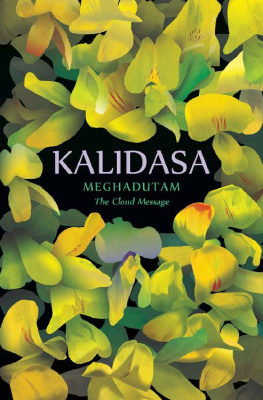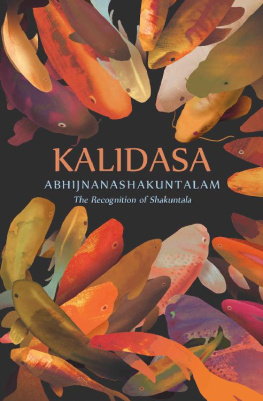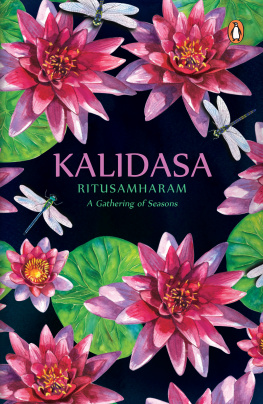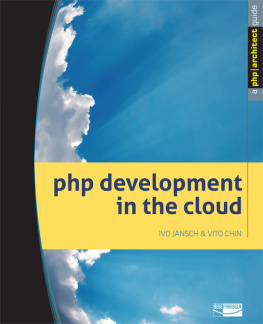The greatest long poem in classical Sanskrit by the greatest poet of the language,
celebrates the love story of Siva and Parvati, whose passionate union results in the birth of their son, the young god Kumara.
Beginning with a luminous description of the birth of Parvati, the poem proceeds in perfectly pitched sensuous detail through her courtship with Siva until the night of their wedding. It plays out their tale on the immense scale of supreme divinity, wherein the gods are viewed both as lovers and as cosmic principles. Composed in eight scintillating cantos, the verses of Kumarasambhavam continue to enchant readers centuries after they were first written. Hank Heifetzs sparkling translation brings to life the heady eroticism and sumptuous imagery of the original. Poetry/HB
Also by the Same Author
Raghuvamsham
Translated by A.N.D. Haksar
How great was the dynastydescended from the Sun,and how slight the capacityof what I comprehend?Foolishly do I wish to crossthe ocean in a small canoe. Long considered as Kalidasas greatest work,
Raghuvamsam is an epic poem in classical Sanskrit.
It recounts the legendary tales of the Raghu dynasty, whose scions include the divine hero of the Ramayana. In this majestic mahakavya, Kalidasa invokes the whole gamut of literary flavours, ranging from the erotic and the heroic to the tragic and comic, the horrific and peaceful. The forbears and the descendants of Rama are also brought to life. Within these pages we see the ideal couple, Dilipa and Sudakshina, their son Raghus valour and generosity, the tragic love of Aja and Indumati, the travails of Dasaratha, the feats of Kusha and Atithi, and finally, the dynastys downfall with Sudarshana and Agnivarna. Composed in nineteen cantos, this mesmerizing, lyrical and very accessible new translation of Raghuvamsam will continue to enthrall readers with its insights into ancient India, its land, people and seasons, and its social and cultural values that are still relevant today. Epic/Poetry/HB
Also by the Same Author
Abhijnanashakuntalam
Translated by Vinay Dharwadker
Who can she be,With her physical beautyObscured by silken sheaths like veils,Standing among these asceticsLike a fresh sprigSprouting in the midst of yellow leaves? Kalidasas most famous play refashions an episode from the Mahabharata, magnificently dramatizing the love story of Shakuntala, a girl of semi-divine origin, and Dushyanta, a noble human king.
After their brief and passionate, but secret, union at her fathers forest ashram, Dushyanta must return to his capital. He gives Shakuntala his signet ring, promising to make her his queen when she joins him later. But, placed unawares under a curse, he forgets herand she loses the ring that would have enabled him to recognize her. Will the lovers be reunited? The worlds first full-length play centred on a comprehensive love story, The Recognition of Shakuntala is an undisputed classic of the ancient period. Vinay Dharwadkers new translation is the definitive poetic rendering of this romantic-heroic comedy for the twenty-first-century stage. Epic/Poetry/HBfor Amma and Nanna
Translators Preface
The merit of originality is not novelty; it is sincerity. Thomas Carlyle Prior to 1982 the Jnanpith Award used to be presented to an Indian writer in recognition of a single outstanding work.
Epic/Poetry/HBfor Amma and NannaTranslators Preface
The merit of originality is not novelty; it is sincerity. Thomas Carlyle Prior to 1982 the Jnanpith Award used to be presented to an Indian writer in recognition of a single outstanding work.
In 1970 Vishwanatha Satyanarayana, one of the most prolific Telugu writers of modern times, was honoured with this award for his Ramayana Kalpavrukshamu, a retelling of the Rama story. Given his vast oeuvre filled with hundreds of bold and original writings, why did the committee single out yet another version of the Ramayana, a translation so to speak, for such praise? The poet himself addresses this issue in his introduction. If you ask, Why yet another Ramayana?Id say that in this world, for all timeseveryone eats the same food every day,but the taste of it is ones own.Everybodys life is their own,we all make our own way,and each ones experience is ones own.I worship the same Rama as everyone elsebut the devotion in my poetry is my own.Ninety per cent of crafting a poemrests with the creativity of the poet.The wise and learned know these emotions to bea thousand times greater than any bold new story. Satyanarayanas views are forthright and unequivocal: the worth of a poem lies almost exclusively in the imaginative spirit of the poet (kavi pratibha). In fact, literary originality in India was never measured by a poets choice of subject but rather by the idiosyncratic manner in which a poet could tell a known story anew. This is why we encounter numerous poems in the later period that praise stylistic novelty and innovation, and hardly (if any) verses bemoaning a poets recourse to weathered themes. It is like the unfolding of a raga in classical music, wherein rasikas rarely savour a new raga or an unconventional tala, but instead delight in the fresh individuality that a consummate artiste brings to bear in the expansion of a traditional raga.













